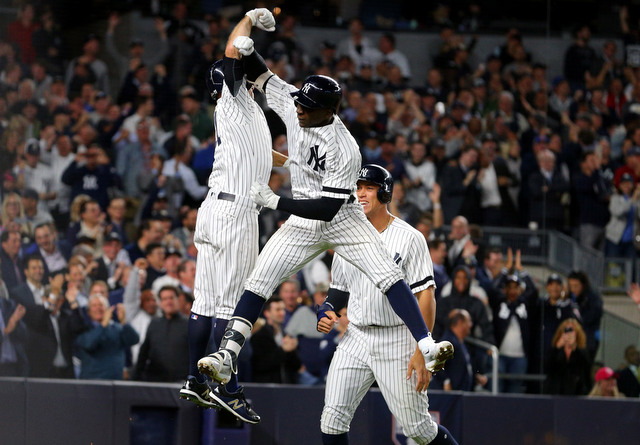
Tuesday: Today’s MRI revealed a Grade II lat strain and Luis Severino will be shut down six weeks, the Yankees announced. They say it is a new injury independent of the rotation cuff inflammation. Six week shutdown means the best case scenario is a mid-to-late June return for Severino. Rats.
Monday: Luis Severino is heading to New York for tests and further examination on his shoulder, Aaron Boone announced this afternoon. Supposedly Severino does not feel any pain, but he is “not where he needs to be” and isn’t making as much progress with his throwing program as expected.
Severino was shut down with rotator cuff inflammation on March 5th and he’s spent the last few weeks throwing down in Tampa. He’s been long-tossing at a distance beyond 120 feet, but has not been able to get back on a mound. That was initially expected to happen a week ago and never did.
Brian Cashman recently said the Yankees were hoping to get Severino back in early May. That is almost certainly not happening now. Even if these latest tests bring back good news, Severino has a lot of rehab work ahead of him to get to MLB ready. Late May or June is probably the best case scenario now.
Given the natural of the injury, the Yankees should move forward as if Severino will not be back at all this year. Treat whatever you get from him as a bonus. If the Yankees don’t want to splurge for Dallas Keuchel, fine, but they should start looking at the trade market, which they probably already are.
CC Sabathia is expected to rejoin the Yankees next weekend, which means either Domingo German or Jonathan Loaisiga will be stashed in Triple-A as depth. The Yankees also have Gio Gonzalez in Triple-A for at least another two weeks. The depth isn’t bad. It’s just that you don’t want to have to use it.
The downside is the Yankees are without their best pitcher and won’t get him back anytime soon. Winning the AL East was going to be difficult with a healthy Severino. Now they have to do it without him for a chunk of the season. Even the best case scenario right now is bad news for the 2019 Yankees.




